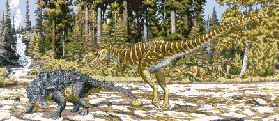
| Palaeos: Mesozoic |  |
Late Cretaceous |
| Cretaceous Period | The high Cretaceous |
| Page Back | Back: Early Cretaceous II | Back: Jurassic | Up: Cretaceous | Unit Home |
| Page Next | Next: Late Cretaceous II | Next: Paleogene | Down: Cenomanian | Timescale |
|
Cretaceous Neocomian Early Cretaceous I Aptian-Albian (Early Cretaceous II) High Cretaceous (Late Cretaceous I) Cenomanian Age Turonian Age Coniacian Age Santonian Age End Cretaceous (Late Cretaceous II) |

an ankylosaur herbivore is menaced by
a tyrannosaurid
predator
from American Museum of Natural History Timelines
Exhibit
| Epoch | Age | sub-age | time
MYA |
Land Mammal Age (North America) | Terrestrial Vertebrate age
(Asia0 |
date
A |
date
B |
|
| Late Cretaceous |
Late Cretaceous II "End-Cretaceous" |
Maastrichtian | Late | 65 | Puercan | 65.3 | ||
| 66
67 |
Lancian | |||||||
| Early | 68
69 |
Nemegtian | 69.7 | |||||
| 70
71 |
Edmontian | 71.3 | ||||||
| Campanian | Late | 72 | Nem. or Barun. | 72.1 | ||||
| 73
74 75 76 77 78 79 80 |
Judithian | Barungoyotian | ||||||
| Early | 81 | 81.1 | ||||||
| 82 | Aquilian | "Djadochtian" | ?? | |||||
| 83 | 83.5 | |||||||
| Late Cretaceous I "High Cretaceous" |
Santonian | Late | 84 | |||||
| Early | 85 | 85.8 | ||||||
| Coniacian | Late | 87 | ||||||
| Early | 89 | 89.9 | ||||||
| Turonian | ||||||||
| Cenomanian |
dating B "A Triassic, Jurassic and Cretaceous
time scale," by Gradstein, F.M., F.P. Agterberg, J.G. Ogg, J. Hardenbol,
P. van Veen, J. Thierry and Z. Huang. 1995.in pp. 95-126 of W.A. Bergrgren,
D.V. Kent, M.-P. Aubry & J. Hardenbol (eds.), Geochronology, Time
Scales, and Global Stratigraphic Correlation. SEPM Special Publication
No.54.)
In the middle Permian the gymnosperm-dominated Mesophytic flora emerges
(although Mesophytic type plants go back to the Carboniferous, just as some
Paleophytic plants survive even to this day), and this flourishes right up until
the middle and later Cretaceous. At this time, when the dinosaurs and other
Mesozoic animals are in full swing, the current, angiosperm-dominated Cenophytic
flora emerges (in fact Angiosperms appear in the later Early Cretaceous, but do
not become predominant until the later Cretaceous). The Cenophytic flora
continues quite happily through the great K-T
extinction that eliminated the dinosaurs and many other forms of animal life
(including some marsupial mammal and early bird types), although some modern biome-types like grasslands only appeared very recently (during the Miocene epoch).
MAK010115.
![]()
![]() Late
Cretaceous - Dr
Ron Blakey's
Late
Cretaceous - Dr
Ron Blakey's![]() Global
Earth History
Global
Earth History
| Page Back | Unit Home | Page Top | Page Next |